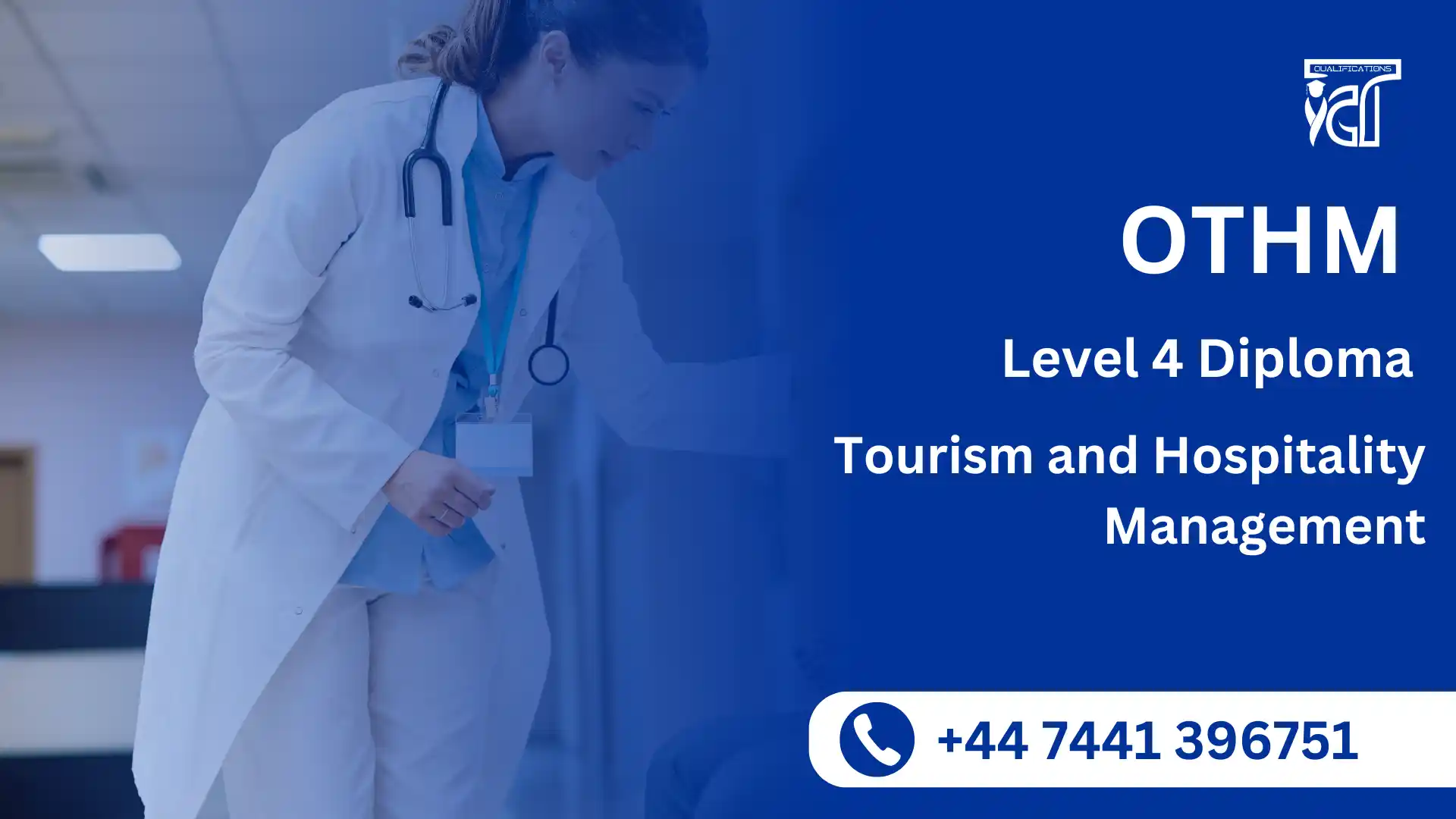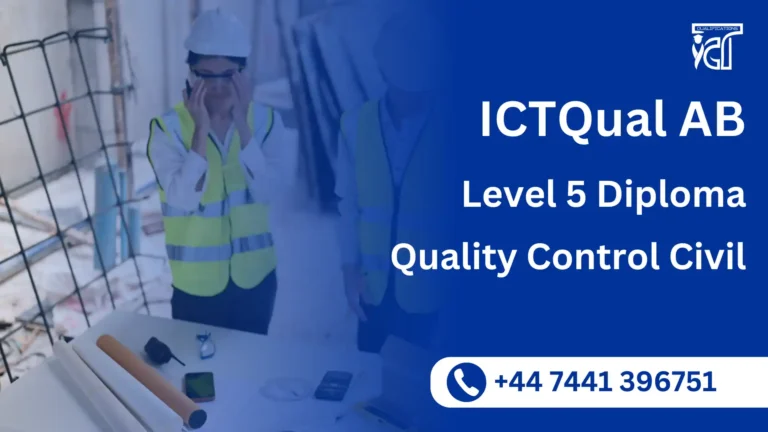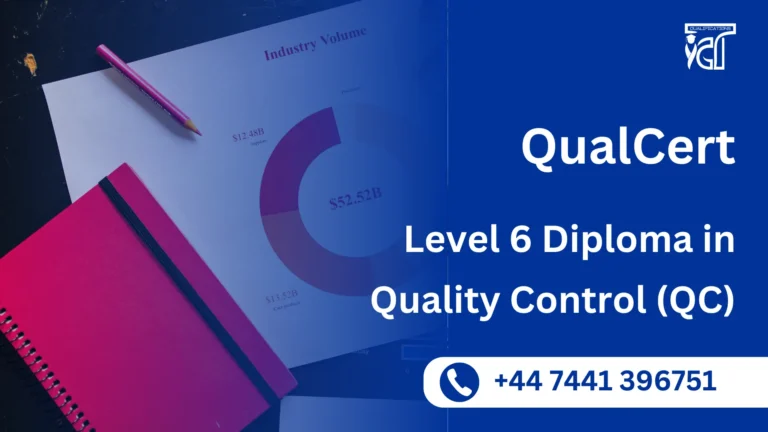Tourism and hospitality are among the fastest-growing industries worldwide, offering exciting career prospects for individuals passionate about service, travel, and customer experiences. The OTHM Level 4 Diploma in Tourism and Hospitality Management is a prestigious qualification designed to equip learners with the essential skills and knowledge to excel in this dynamic sector.
The OTHM Level 4 Diploma in Tourism and Hospitality Management is an Ofqual-regulated qualification, ensuring high academic standards and industry relevance. This diploma provides learners with a solid foundation in tourism and hospitality principles, preparing them for advanced studies or immediate entry into the workforce.
Graduates of the OTHM Level 4 Diploma in Tourism and Hospitality Management can pursue diverse career opportunities, including roles in hotels, travel agencies, event management, and tourism boards. Additionally, this diploma serves as a pathway to higher-level qualifications, such as the OTHM Level 5 Diploma in Tourism and Hospitality Management or a university degree in a related field.
The OTHM Level 4 Diploma in Tourism and Hospitality Management is an ideal qualification for those looking to build a strong foundation in the tourism and hospitality industry. Its flexible, assignment-based approach makes it accessible for learners from various backgrounds. Whether you are beginning your career, switching fields, or aiming for career advancement, this diploma provides the knowledge and credentials needed to thrive in this vibrant sector.
OTHM Level 4 Diploma in Tourism and Hospitality Management
The OTHM Level 4 Diploma in Tourism and Hospitality Management comprises six mandatory units, totaling 120 credits, with a Total Qualification Time (TQT) of 1,200 hours and 600 Guided Learning Hours (GLH) upon completion.
Level 4 Mandatory units:
| Sr# | Unit Title | Credits | GLH |
|---|---|---|---|
| 1 | Academic Writing and Research Skills | 20 | 100 |
| 2 | Business Environment for Tourism and Hospitality | 20 | 100 |
| 3 | Services Marketing in Tourism and Hospitality | 20 | 100 |
| 4 | Sustainability in Tourism and Hospitality | 20 | 100 |
| 5 | Events Management | 20 | 100 |
| 6 | The Development of the Tourism and Hospitality Industry | 20 | 100 |
GLH (Guided Learning Hours) and TQT (Total Qualification Time) are terms commonly used in vocational qualifications to help define the amount of time a learner is expected to spend on heir studies.
1. GLH (Guided Learning Hours)
GLH refers to the number of hours a learner spends being directly taught, supervised, or supported during their course. This includes the time spent in activities such as:
- Classroom instruction
- Practical workshops
- One-on-one tutoring or mentoring sessions
- Online learning sessions with tutor support
In other words, GLH represents the time that learners are actively engaged with their instructors or learning activities.
2. TQT (Total Qualification Time)
TQT represents the total amount of time a learner is expected to invest in completing a qualification, including:
- GLH (Guided Learning Hours): Time spent on direct learning, as explained above.
- Self-Directed Learning: This includes time spent on independent study, research, assignment completion, preparation for exams, and any other work the learner does outside of direct teaching hours.
TQT is a broader measure that includes all the time required to achieve the qualification. It helps learners and employers understand the overall commitment required for the qualification.
Key Differences Between GLH and TQT:
- GLH focuses on direct learning with guidance or supervision.
- TQT includes GLH as well as independent study time and other learning-related activities.
Example:
If a qualification has a TQT of 600 hours and a GLH of 250 hours, it means the learner should spend 250 hours in direct learning (classroom, online, or tutor-led sessions) and 350 hours on independent study or research.
Learning Outcomes of OTHM Level 4 Diploma in Tourism and Hospitality Management
Academic Writing and Research Skills
- Understand the concept and purpose of academic research and writing.
- Understand how to conduct academic research.
- Be able to demonstrate critical thinking skills.
- Understand how to construct a reliable and valid academic argument.
Business Environment for Tourism And Hospitality
- Know about the nature and role of public sector organisations in the tourism and hospitality industry.
- Know about the nature and role of private sector organisations in the tourism and hospitality industry.
- Be able to analyse the internal environment in which tourism and hospitality businesses operate.
- Be able to analyse the external environment in which tourism and hospitality businesses operate.
Services Marketing in Tourism and Hospitality
- Understand the principles of services marketing in the tourism and hospitality industry
- Know about the components of the marketing mix.
- Know about the principles of consumer behaviour in the tourism and hospitality industry.
- Understand the nature and importance of customer service in the tourism and hospitality industry.
- Sustainability in Tourism and Hospitality
- Understand sustainability and the sustainable development concept.
- Understand the impacts of the tourism and hospitality industry on destinations.
- Understand the principles of sustainable tourism.
- Understand sustainability initiatives in tourism and hospitality businesses
Events Management
- Understand different types of events.
- Understand the different types of events that take place within the tourism and hospitality industry.
- Understand the characteristics of the Meetings, Incentives, Conferences & Exhibitions (MICE) sector
- Understand the impact that events can have on tourism destinations.
The Development of the Tourism and Hospitality Industry
- Understand the main factors affecting the development of the tourism and hospitality industry.
- Know about the factors affecting consumer demand within the tourism and hospitality industry
- Understand the roles and functions of organisations within the tourism and hospitality industry.
- Understand the roles, functions and actions of destination management organisations.
The OTHM Level 4 Diploma in Tourism and Hospitality Management is a highly regarded qualification that provides numerous benefits for learners aiming to excel in the tourism and hospitality industry. Below are the key advantages of pursuing this diploma:
1. Industry Recognition and Global Acceptance
As an Ofqual-regulated qualification, this diploma is recognized internationally, ensuring that learners gain a reputable certification that enhances their career prospects in various global markets.
2. Comprehensive Skill Development
The course covers essential topics such as customer service, marketing, event management, and hospitality operations, equipping learners with practical skills required for real-world applications.
3. Flexible and Assignment-Based Learning
Unlike traditional exam-based courses, this diploma is entirely assignment-based, allowing learners to demonstrate their understanding through practical assessments. This approach is ideal for individuals who prefer coursework over examinations.
4. Career Advancement and Progression
Graduates can secure entry-level roles in hotels, travel agencies, and event management firms or pursue further studies, such as the OTHM Level 5 Diploma or a university degree.
5. Accessible Entry Requirements
With eligibility for both recent high school graduates and mature learners with industry experience, this diploma provides an inclusive pathway to higher education and career success.
By enrolling in this program, learners gain industry-relevant knowledge, hands-on experience, and a recognized qualification that opens doors to various career opportunities.
The OTHM Level 4 Diploma in Tourism and Hospitality Management is designed for individuals who are passionate about the dynamic and fast-growing hospitality and tourism industry. This qualification is ideal for a diverse range of learners, including:
1. Aspiring Hospitality and Tourism Professionals
Individuals who wish to kick-start their careers in hotels, resorts, travel agencies, or event management companies will benefit from this diploma by gaining the foundational knowledge and skills required in the industry.
2. Career Changers Seeking New Opportunities
Professionals from other fields looking to transition into the tourism and hospitality sector will find this course an excellent starting point, as it provides comprehensive training without requiring prior industry experience.
3. Recent High School Graduates
Students who have completed their secondary education and want to pursue a career-focused qualification before enrolling in a university program will find this diploma a great stepping stone to higher education.
4. Working Professionals Seeking Career Growth
Employees in the tourism and hospitality sector who aim to enhance their qualifications and secure promotions can use this diploma to strengthen their credentials and improve career prospects.
With its flexible learning structure and industry-relevant curriculum, this diploma is perfect for individuals eager to build a rewarding career in the global tourism and hospitality industry.
Entry Requirements
Register Now
Qualification Process
Qualification Process OTHM Level 4 Diploma in Tourism and Hospitality Management
- Self-Assessment:
Begin by evaluating your eligibility to ensure you meet the qualification requirements, including work experience, knowledge, and language proficiency. - Registration:
Complete your registration by submitting the required documents, including a scanned copy of a valid ID, and paying the registration fee. - Induction:
An assessor will conduct an induction to confirm your eligibility for the course and explain the evidence requirements. If you do not meet the criteria, your registration will be canceled, and the fee will be refunded. - Assignments & Evidence Submission:
Provide all assignments and the necessary evidence based on the assessment criteria outlined in the course. If you are unsure of the required evidence, consult with the assessor for guidance on the type and nature of evidence needed. - Feedback and Revision:
The assessor will review your submitted evidence and provide feedback. Evidence that meets the criteria will be marked as “Criteria Met,” while any gaps will be identified. You will be asked to revise and resubmit if needed. - Competence Evidence:
Submit final evidence demonstrating that all learning outcomes have been met. This evidence will be marked as “Criteria Met” by the assessor once it is satisfactory. - Internal Quality Assurance (IQA):
The Internal Quality Assurance Verifier (IQA) will review your evidence to ensure consistency, quality, and compliance with standards. - External Verification:
The IQA will submit your portfolio to OTHM External Quality Assurance Versifier (EQA) for final confirmation. The EQA may contact you directly to verify the authenticity of your evidence. - Certification:
Upon successful completion of all checks, OTHM will issue your official certificate, confirming that you have attained the OTHM Level 4 Diploma in Tourism and Hospitality Management







